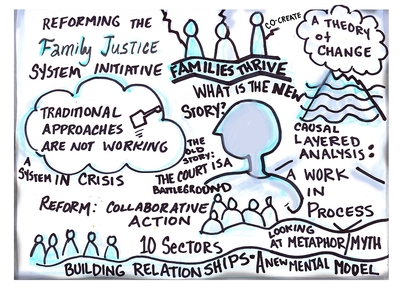Reforming the family justice system initiative
Jehn, Michelle, Spina, Jessica, Lowe, Diana and Turner, Barb (2015) Reforming the family justice system initiative. In: Relating Systems Thinking and Design (RSD4) 2015 Symposium, 1-3 Sep 2015, Banff, Canada.
Preview |
Text
Jehn_Reforming_2015.pdf Download (317kB) | Preview |
![Jehn_Rforming_MindMap.jpg [thumbnail of Jehn_Rforming_MindMap.jpg]](https://openresearch.ocadu.ca/2034/2.hassmallThumbnailVersion/Jehn_Rforming_MindMap.jpg)  Preview |
Image
Jehn_Rforming_MindMap.jpg Download (552kB) | Preview |
Preview |
Text
Jehn_Slides_2015.pdf Download (1MB) | Preview |
Abstract
Family breakdown is common and brings with it many challenges for parents and their children.
These challenges are compounded by the current family justice system, which is adversarial in
nature, complex and costly for families. Over the years, the justice community has tried isolated
interventions to improve access to justice, and while these projects, reforms and programs have
achieved some good, they have not created the system-wide change we desire. We’ve learned from
past experience that the only way to bring about meaningful, systemic change is to have a broad
collaboration of all the participants in the justice system come together to work collectively to create
the change we desire. In the RFJS initiative, we are exploring systemic design processes to address
complex problems through systemic change.
This case study includes a description of the steps taken to bring together a collaborative
alliance made up of approximately 200 individuals and organizations representing ten sectors that
work within the broadly defined family justice system. Over the past year, we have held four
workshops designed to build community and relationships among the collaborators; to gather
information about the focus of concern within our collaborative alliance; to develop an
understanding of systemic change and innovative lab processes; and to ensure that there is a shared
commitment to change.
The main technique and method used throughout this process was Causal Layered Analysis
(CLA) developed by Sohail Inayatullah, a futures studies researcher. While our current family
justice system is characterized by a focus on family breakdown and legal responses, the space
created through CLA enables us to consider solutions that might exist entirely outside the current
understanding. Additionally, the language of the mental model and Theory of Change help us to
understand and talk about the system in new ways that are much more focused on helping families
to thrive, and recognize that family justice issues are primarily social and relationship problems
which contain a legal element.
This initiative is increasing the knowledge and capacity for systemic change among all
participants in the RFJS. We are building an awareness and understanding of innovative
approaches, developmental evaluation and collaborative action that has not previously existed
among these participants. This project is opening up a space to enable stakeholders (clients,
families, and those who work within the system) to reframe the problems that they encounter in
family justice. We are creating a culture of learning that allows us to learn as we go forward, and
will support continued improvement in the family justice system.
| Item Type: | Conference/Workshop Item (Paper) |
|---|---|
| Divisions: | Faculty of Design |
| Date Deposited: | 10 Oct 2017 13:48 |
| Last Modified: | 20 Dec 2021 18:15 |
| URI: | https://openresearch.ocadu.ca/id/eprint/2034 |
Actions (login required)
 |
Edit View |

 Tools
Tools Tools
Tools